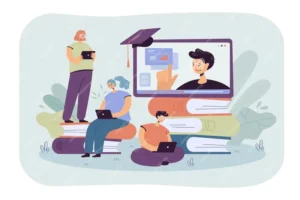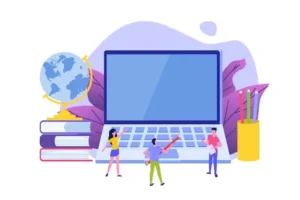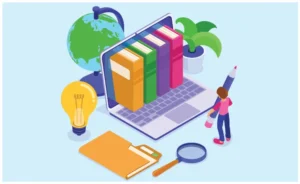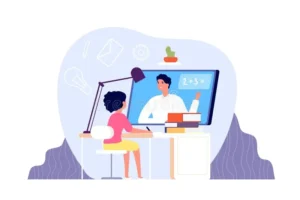Exploring Online K-12 Education: 20 Common Questions Answered

Online K-12 Education has gained significant attention and popularity in recent years, offering an alternative approach to traditional schooling. With its flexibility, accessibility, and personalized learning experiences, it’s no wonder parents and students have questions about this innovative method of education. In this comprehensive article, we will address 20 common questions about Online K-12 Education, providing insightful answers to help you better understand this educational option.
Contents
- 1. What is Online K-12 Education, and how does it work?
- 2. How can I enroll my child in an Online K-12 program?
- 3. Are Online K-12 schools accredited and recognized by colleges and universities?
- 4. What are the advantages of Online K-12 Education compared to traditional schooling?
- 5. What equipment and technology do students need for Online K-12 classes?
- 6. Are there age restrictions for students in Online K-12 programs?
- 7. How do Online K-12 teachers interact with students and provide support?
- 8. What types of courses and subjects are available in Online K-12 programs?
- 9. Can students with disabilities receive appropriate support in Online K-12 Education?
- 10. Is Online K-12 Education suitable for homeschooling or part-time learning?
- 11. What safety measures are in place to protect students in virtual classrooms?
- 12. How do students in Online K-12 programs take exams and assessments?
- 13. What is the role of parents in supporting their child’s Online K-12 education?
- 14. Are there extracurricular activities and socialization opportunities for online students?
- 15. How do colleges and universities view Online K-12 graduates during the admissions process?
- 16. Can students transition from traditional schooling to Online K-12 programs?
- 17. What is the cost of Online K-12 Education, and are there financial aid options?
- 18. Are there international Online K-12 programs for students living outside the United States?
- 19. How can I ensure my child stays motivated and engaged in Online K-12 classes?
- 20. What is the future of Online K-12 Education, and what trends are emerging in the field?
1. What is Online K-12 Education, and how does it work?
Online K-12 Education, often referred to as virtual schooling, involves students completing their primary and secondary education courses over the internet. It typically combines live virtual classes, interactive assignments, and self-paced learning modules. Accredited online schools or programs deliver the curriculum, allowing students to study from anywhere with an internet connection.
2. How can I enroll my child in an Online K-12 program?
Enrolling your child in an Online K-12 program typically involves researching and selecting a reputable online school, completing the application process, and providing necessary documentation, such as transcripts and proof of residence. Each school may have specific enrollment requirements, so it’s essential to follow their guidelines.
3. Are Online K-12 schools accredited and recognized by colleges and universities?
Many Online K-12 schools are accredited by regional or national accrediting bodies, ensuring that their curriculum meets high educational standards. Accreditation increases the likelihood that colleges and universities will recognize and accept transcripts from online K-12 graduates.
4. What are the advantages of Online K-12 Education compared to traditional schooling?
Online K-12 Education offers advantages such as flexibility, individualized learning, a wide range of courses, and a safe learning environment. Students can customize their learning schedules and receive personalized attention from teachers, allowing them to excel academically.
5. What equipment and technology do students need for Online K-12 classes?
To participate in Online K-12 classes, students typically need a computer or tablet with internet access, a webcam, and a headset with a microphone. Additionally, some courses may require specific software or applications.
6. Are there age restrictions for students in Online K-12 programs?
Online K-12 programs cater to students from kindergarten through 12th grade. Age eligibility varies depending on the specific program or school. Generally, students must meet the minimum age requirements for each grade level.
7. How do Online K-12 teachers interact with students and provide support?
Online K-12 teachers use various methods to interact with students, including live virtual classes, discussion forums, email, and one-on-one video conferences. They offer academic support, guidance, and feedback to help students succeed.
8. What types of courses and subjects are available in Online K-12 programs?
Online K-12 programs offer a wide range of courses, including core subjects like mathematics, science, language arts, and social studies. They also provide elective courses, advanced placement (AP) courses, and special education programs to cater to diverse student needs.
9. Can students with disabilities receive appropriate support in Online K-12 Education?
Online K-12 programs are committed to providing equal educational opportunities for all students, including those with disabilities. They offer Individualized Education Programs (IEPs), accommodations, and resources to support students with disabilities in their online learning journey.
10. Is Online K-12 Education suitable for homeschooling or part-time learning?
Yes, many families choose Online K-12 Education for homeschooling or part-time learning. It offers flexibility and allows parents to actively engage in their child’s education while providing access to accredited curriculum and certified teachers.
11. What safety measures are in place to protect students in virtual classrooms?
Online K-12 schools prioritize student safety by implementing strict privacy policies, secure login systems, and monitoring mechanisms. Teachers and administrators work to create a safe and respectful online learning environment.
12. How do students in Online K-12 programs take exams and assessments?
Students in Online K-12 programs take exams and assessments online, often in a secure, proctored environment. Schools use various assessment methods, including quizzes, exams, essays, and projects, to evaluate student progress and achievement.
13. What is the role of parents in supporting their child’s Online K-12 education?
Parents play a crucial role in supporting their child’s online education by providing a dedicated learning space, maintaining a consistent schedule, and actively participating in their child’s educational journey. Communication with teachers and staying engaged are also essential.
Yes, many online schools offer extracurricular activities such as clubs, sports teams, and virtual events to promote socialization and student engagement. Additionally, students can participate in local community activities and socialize with peers outside of school hours.
15. How do colleges and universities view Online K-12 graduates during the admissions process?
Colleges and universities typically view Online K-12 graduates positively, especially if they come from accredited programs. Admissions decisions are based on a holistic evaluation of applicants, considering factors such as grades, standardized test scores, extracurricular activities, and letters of recommendation.
16. Can students transition from traditional schooling to Online K-12 programs?
Yes, students can transition from traditional schooling to Online K-12 programs at various grade levels. Schools may require placement tests or assessments to determine the appropriate grade level for the student.
17. What is the cost of Online K-12 Education, and are there financial aid options?
The cost of Online K-12 Education varies depending on the school or program. Some publicly funded online schools are tuition-free, while others may charge tuition. Financial aid options, scholarships, and grants are available to eligible students to help cover costs.
18. Are there international Online K-12 programs for students living outside the United States?
Yes, several international Online K-12 programs cater to students worldwide. These programs offer curricula tailored to different countries and may provide support for non-English-speaking students.
19. How can I ensure my child stays motivated and engaged in Online K-12 classes?
To keep your child motivated, establish a structured daily routine, set achievable goals, provide positive reinforcement, and communicate regularly with teachers. Encourage self-motivation and foster a love for learning.
20. What is the future of Online K-12 Education, and what trends are emerging in the field?
The future of Online K-12 Education looks promising, with ongoing innovations in technology, adaptive learning platforms, and increased access to high-quality education. Emerging trends include personalized learning, augmented reality, and greater support for students with diverse needs.
In the following sections, we will delve deeper into each of these questions, providing valuable insights and guidance for those considering Online K-12 Education as a viable option for their children’s learning journey.









